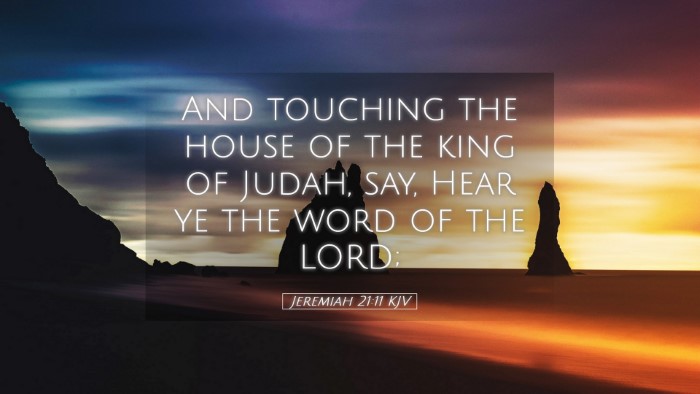Commentary on Jeremiah 21:11
Jeremiah 21:11 states, "And concerning the house of the king of Judah, say, Hear the word of the Lord, O house of David; thus saith the Lord, Execute judgment in the morning, and deliver him that is spoiled out of the hand of the oppressor, lest my fury go out like fire, and burn that none can quench it, because of the evil of your doings."
Contextual Analysis
This passage occurs during a time of impending judgment upon Jerusalem due to King Zedekiah's reign. The scriptures highlight God's directive to the royal house of David, reflecting His ongoing relationship with His people despite their disobedience.
Historical Background
Jeremiah prophesied during a tumultuous period leading up to the Babylonian exile. He was tasked with delivering messages of warning and hope to both the people and the leaders. The political and social context was fraught with injustice, as the leaders failed to uphold righteousness.
Thematic Insights
- Divine Command: The directive to “execute judgment” demonstrates God’s call for just leadership and governance. This reflects an essential theme throughout scripture, emphasizing the importance of equity and mercy.
- Accountability of Leaders: The address to the house of David underscores the responsibility of leaders to care for the vulnerable. This theme resonates deeply within the teachings of Christ and His expectations of leaders.
- God's Wrath: The mention of God's fury evokes a serious warning about the consequences of continued moral decline and injustice. It is a reminder that divine judgment is not only inevitable but is also a response to human action.
Commentary Perspectives
Matthew Henry's Commentary
Henry emphasizes that God's word to the rulers is both a warning and a call to action. He notes that the leaders are tasked with the responsibility of judgment, a role that they must fulfill with utmost integrity. This call reflects a profound truth: a government that ignores the plight of the oppressed invites dire consequences.
Albert Barnes' Notes
Barnes outlines the implications of neglecting justice. He argues that executing justice is foundational to a stable society, and he reiterates that all social structures rest upon the fairness of their leaders. He warns that without righteousness, the nation’s fate is sealed in God’s judgment, indicating the seriousness of their responsibilities.
Adam Clarke's Commentary
Clarke suggests that the strength of a ruler lies not in his might but in his capacity to enact justice. He articulates that the term "morning" signifies urgency, suggesting that immediate action in upholding justice is critical. He also points out that failing to act leads to a more significant alienation from God and intensified wrath.
Theological Implications
The theological implications of Jeremiah 21:11 are profound. It speaks not only to the historical context of Judea but also to contemporary issues that plague societies today. The call for justice reverberates through time as a timeless principle that God expects from those in authority.
Covenantal Relationship
This verse reaffirms the nature of God’s covenant with His people. The call to the house of David represents God’s enduring engagement, suggesting that leaders must be stewards of justice, reflecting God’s character to the people.
Application for Today
For modern-day leaders, both in religious and secular authority, this verse serves as a compelling reminder of the gravity of their position. It encourages a re-examination of their policies and actions towards the marginalized and oppressed in society.
- Justice as a Priority: Leaders must prioritize justice as a primary concern in their governance.
- Compassion for the Oppressed: A key takeaway is the necessity for compassion toward those who are oppressed.
- Awareness of Consequences: Understanding that neglect of these responsibilities may lead to significant spiritual and societal repercussions is essential for integrity in leadership.
Conclusion
In summary, Jeremiah 21:11 serves as a critical reminder of God's expectations for leaders, emphasizing the importance of executing judgment and delivering justice. The insights drawn from the public domain commentaries of Matthew Henry, Albert Barnes, and Adam Clarke collectively urge a commitment to uphold righteousness. As much as this passage was intended for ancient Israel, its message continues to resonate through the ages, calling each generation to an unwavering commitment to justice and mercy.


